By Aanuoluwapo (Aanu) Omoleye, Events Intern, Global Ties U.S.
Every year, the Diplomacy Begins Here Regional Summits bring together leaders from the business, government, and nonprofit sectors from the United States and around the world to foster connections and discuss how international exchange programs and public diplomacy support U.S. cities, foreign policy goals, and global issues. Local communities host these events in partnership with Global Ties U.S. and the Office of International Visitors at the U.S. Department of State. In 2023, the two Summits, which took place in Burlington, Vermont (August 21-22) and in Kansas City, Missouri (September 21-22), were hosted by the Vermont Council on World Affairs and Global Ties KC, respectively, and engaged more than 300 attendees
Burlington, Vermont
From August 21 to 22, the Vermont Council on World Affairs (VCWA) hosted the Diplomacy Begins Here Regional Summit: Building an Inclusive Climate Movement at Hula Lakeside in Burlington, Vermont. This Summit brought together a diverse group of individuals passionate about addressing climate change through community-based solutions and public diplomacy programs.
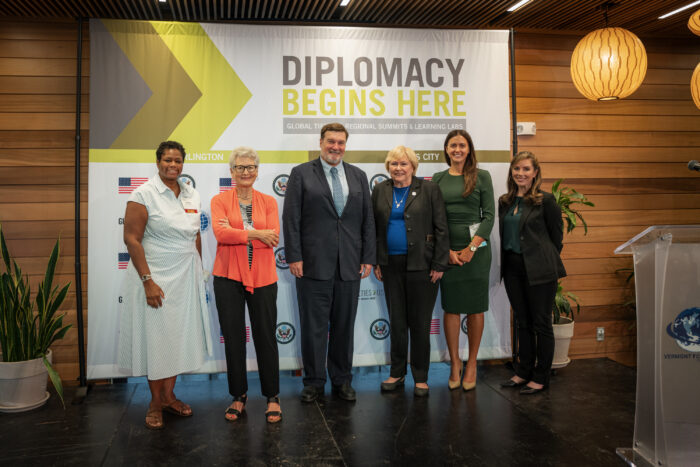
Speakers from the Diplomacy Begins Here Vermont Summit. From left: keynote speaker Tamara Toles O’Laughlin; VCWA Vice Board Chair Denise Johnson; representatives from the U.S. Department of State Scott Weinhold and Anne Grimes; VCWA President Patricia Preston; and Katherine Brown, President & CEO of Global Ties U.S.
The event kicked off with a welcome session featuring VCWA President & CEO Patricia Preston, Principal Deputy Assistant Secretary for the Bureau of Educational and Cultural Affairs Scott Weinhold, VCWA Vice Board Chair Denise Johnson, and the President and CEO of Global Ties U.S. Katherine Brown. These leaders emphasized the importance of fostering an inclusive climate movement locally and globally, setting the stage for a weekend of knowledge sharing and collaboration. “As individuals, we play a role in building a brighter future that transcends borders and unites us in positive change,” said Patricia in her remarks. Added Katherine, “The Global Ties Network is singular in its ability to build community, raise diverse voices, and amplify how we can all be changemakers.”
A highlight of the day was the keynote address delivered by Tamara O’Laughlin, the President and CEO of Environmental Grantmakers Association. In her remarks, Tamara emphasized the importance of a diverse, inclusive, and multidisciplinary approach to addressing climate change. She talked about the need to prepare for and mitigate the effects of climate change through a united front of diverse populations and various stakeholders. “We need to be deeply honest that the doing requires undoing; that the things we are not doing are also doing something,” said Tamara. “Building an inclusive climate movement includes all of us, and places all of us in a narrative that demands change.”
Mary Powell, the Chief Executive Officer of Sunrun Inc., spoke to attendees about the green economy. Said Mary in her lunch keynote address, “One of the most powerful forces in the world is consumerism—It informs markets and ideas, impacts global trends, and has the opportunity to massively shape society.”
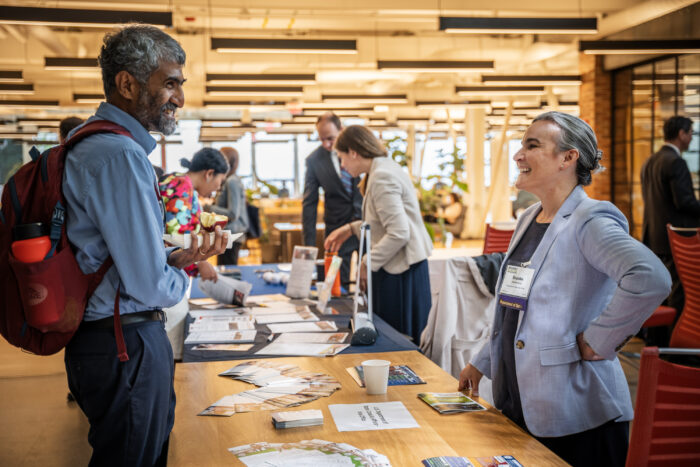
A Summit attendee connects with an exhibitor.
Interactive breakout sessions enabled participants to dive into conversations on environmental justice, the green economy, and how climate change impacts a wide variety of issues and communities. This format allowed attendees to ask pressing questions and engage in meaningful discussions on these topics. Throughout the day, participants also had the opportunity to network with representatives from the U.S. Department of State and exhibitors.
The second day of the event was the Learning Lab, which convened members of the Global Ties Network for tailored breakout sessions and peer-to-peer learning on topics like promoting citizen diplomacy in youth populations and innovative approaches to organizational capacity building.
During the panel on building diverse networks, speakers shared tips and advice for participants, with key takeaways including cultivating a receptive and welcoming environment, not just a tolerant one; how having difficult conversations can help us grow; and how dialogue and collaboration can help create vibrant communities.
From the panel on youth and civic engagement, speakers explored ways to build community buy in. A panelist said, “We need to come to these conversations in an authentic way. Youth are very curious. Set the stage and get out of the way.”
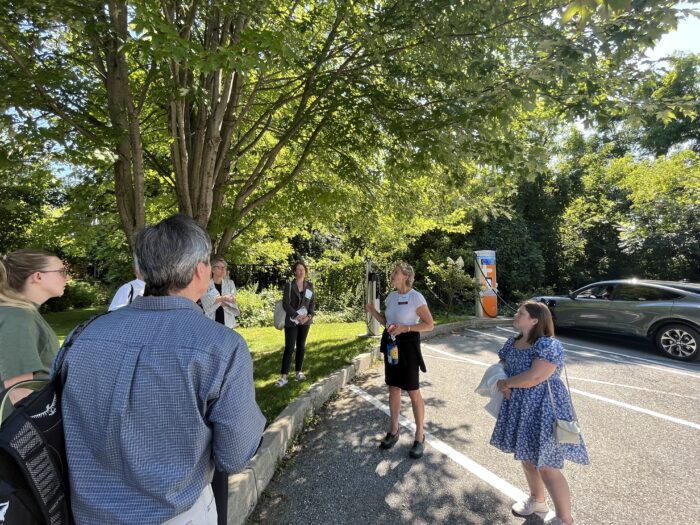
Learning Lab attendees visit the Burlington Electric Department during the guided walking resource tour.
A Guided Walking Resource Tour rounded out the day’s programming, and included stops at the Champlain Miller Center, Generator, and Burlington Electric Department. These site visits offered attendees insights into local environmental initiatives and showcased how the city is adapting to the changing climate.
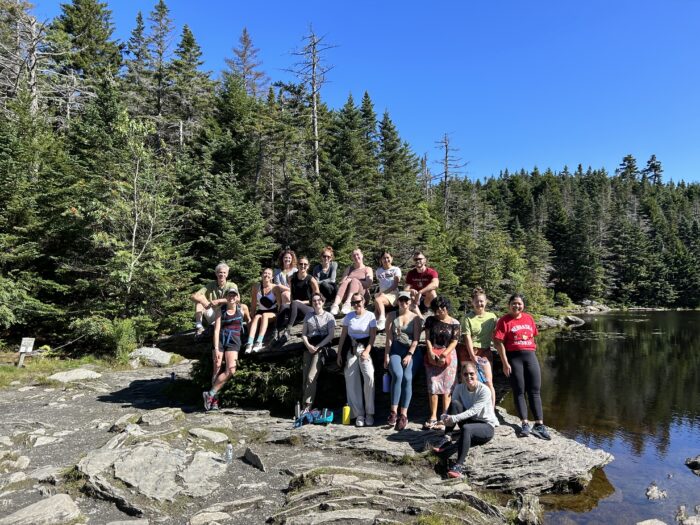
A group photo of attendees in front of a lake during a hike.
The Diplomacy Begins Here Regional Summit and Learning Lab in Vermont was a great opportunity for participants to connect, exchange ideas, and build lasting relationships. Attendees departed the beautiful mountainous city with fresh insights, new connections, and a strengthened determination to make a positive impact on the future of our planet.
Kansas City, Missouri
From September 21-22, Global Ties KC hosted the second and final Diplomacy Begins Here. Summit of 2023 in the heart of the historical city of Kansas City, Missouri.
Programming focused on the theme, “Shaping Foreign Policy from the Heartland,” and provided attendees with a unique experience on how the heartland location has influenced global diplomacy. Pre-event-day activities on September 20 offered out-of-town and local participants the chance to explore the city’s history and culture.
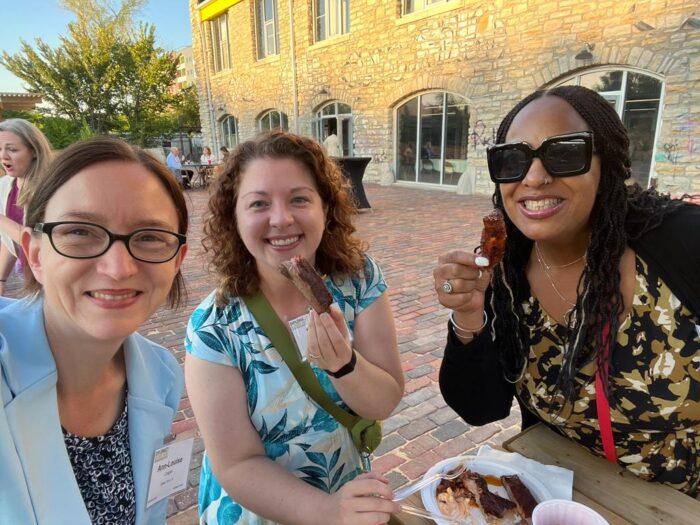
Global Ties U.S. staff enjoy BBQ at the Heartland Welcome Dinner
A resource tour covered the historic 18th and Vine district, highlighting Kansas City’s contributions to green design, community development, and revitalization, and attendees enjoyed an all-you-can-eat BBQ welcome dinner, featuring barbecue from local restaurants, to kick off the Summit on a delicious note.
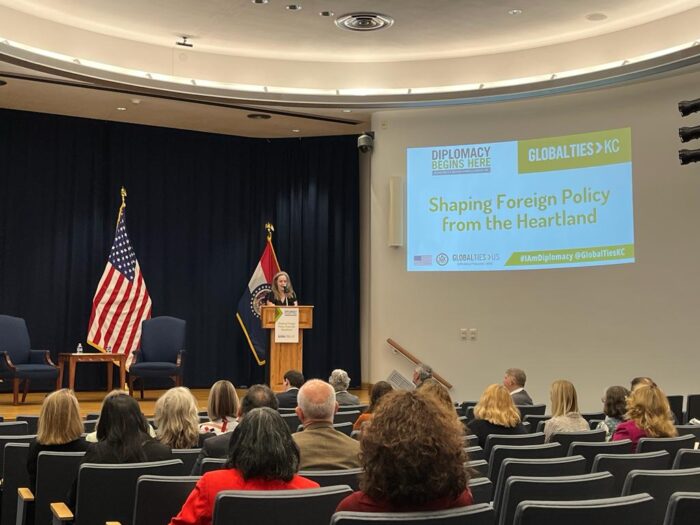
Courtney Brooks, President & CEO of Global Ties KC, welcomes attendees to the Summit
The Summit was held at the Harry S. Truman Presidental Library. The day commenced with opening remarks from Chris Miner, the Managing Director for Professional and Cultural Exchanges at the U.S. Department of State, and Courtney Brooks, the President & CEO of Global Ties KC. “We are proud to bring what the heartland offers to the world,” said Courtney in her welcome remarks. “Midwesterners have been shaping foreign policy for a long time. We are being very literal when we say ‘Diplomacy Begins Here.’”
The morning continued with a fireside chat featuring Amy Storrow, the Director of the Office of International Visitors at the U.S. Department of State, and Mark Adams, the Education Director at the Harry S. Truman Presidential Library and Museum. The two speakers discussed the legacy of President Truman and the historical and modern-day significance of Kansas City to U.S. foreign policy, as well as how to integrate foreign and domestic policy. In reflecting on the leadership of President Truman, the speakers noted the significance of the Summit’s venue, stating: “Presidential libraries foster growth in the study of democracy. It’s exciting to have students downstairs today going through a diplomacy simulation.”
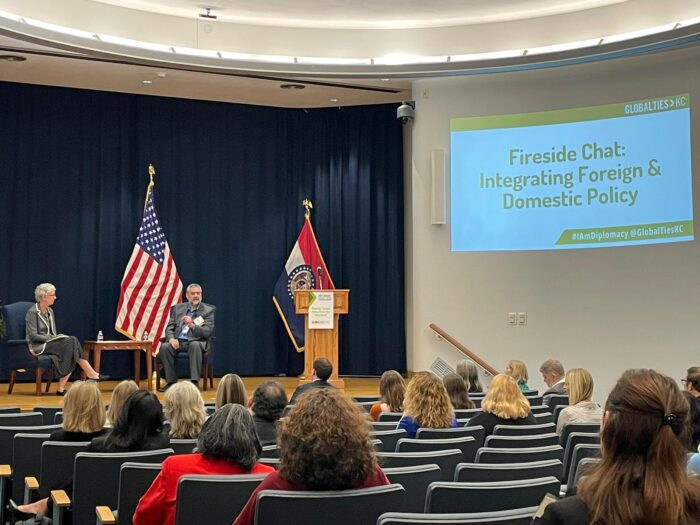
Fireside chat with Mark Adams and Amy Storrow on Integrating Foreign & Domestic Policy
For student attendees, an interactive diplomacy simulation of the White House Decision Center provided participants with a hands-on opportunity to learn about diplomacy. Through a role-playing activity, students developed essential skills in critical thinking, persuasive communication, and global competence by taking on the roles of key stakeholders to address diplomacy crisis from the perspectives of the White House.
Concurrent sessions provided attendees with a platform for in-depth discussions and knowledge sharing. From engaging rural communities in foreign policy to examining the impact of international trade in local communities, these sessions allowed participants to explore key areas at the intersection of foreign and domestic policy.
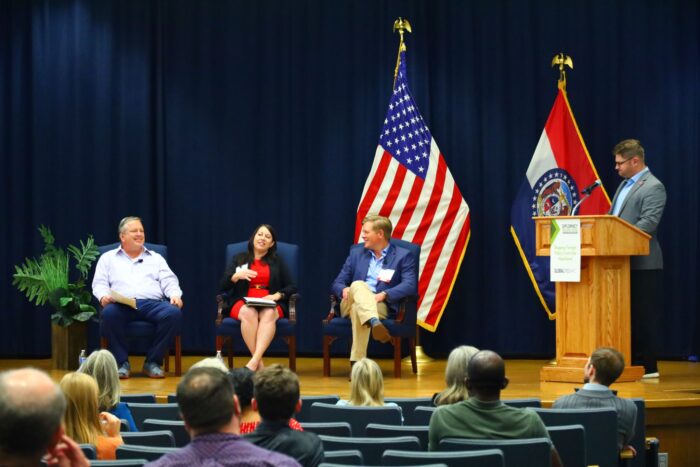
Panelists discuss international trade in the local community. From left: Drew Felling, Vice President of International Trade at Commerce Bank; Melissa Miller, Director of the World Trade Center Kansas City; Kevin Holland, Vice President of Lockton Global Solutions; and Jim Erickson, Director of Strategic Initiatives at the Economic Development Council of KCMO, as the moderator
“Rural is a common denominator, a common language, a common culture we can build on,” says Trisha Purdon, Director of the Office of Rural Prosperity at the Kansas Department of Commerce, in the panel on rural communities. “From Kansas to Kazakhstan, we are finding commonalities and looking for solutions to shared challenges.
The Summit closed with a keynote on the importance of subnational and city diplomacy. In his remarks, Daniel Ricchetti, Deputy Special Representative for City and State Diplomacy, said, “You have such immense soft power…. We want to learn from you, we want to hear from you.”
To round out the day, participants had opportunity to learn about and immerse themselves in the defining music of Kansas City jazz at the American Jazz Museum, located in the historic 18th and Vine district. The soulful rhythms of jazz served as a reminder of the city’s rich cultural heritage.
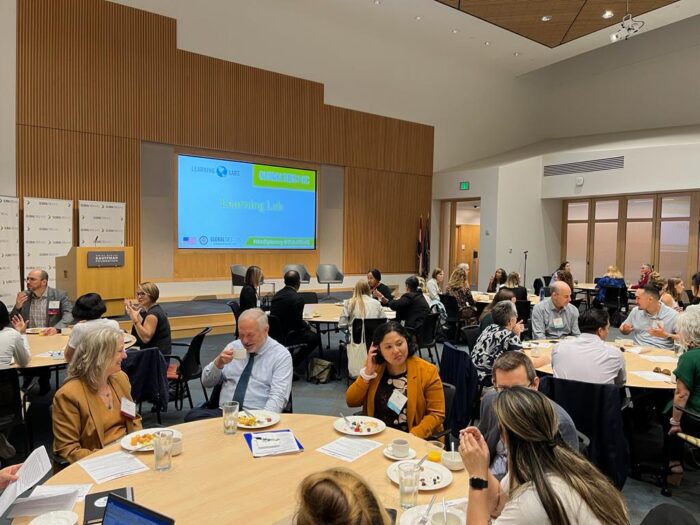
Global Ties Network members during a networking breakfast at the Learning Lab
The final day of the Summit brought together Global Ties U.S. Community-Based Members, National Program Agencies, and representatives from the U.S. Department of State Office of International Visitors, for the Learning Lab.
Programming took place at the Kauffman Foundation and provided a platform for stakeholders to delve into strategies and practices for community-building, advocacy, fundraising, and International Visitor Leadership Program (IVLP) programming. The participants engaged in productive discussions and shared their insights to strengthen the impact of their work.
“Be unafraid to be uncommon. We have to be uncommon to make change,” says DeAngela Burns-Wallace, the CEO of Kauffman Foundation, in conversation with Courtney Brooks. “Access and opportunity are the game changers. But they need resources to match and to make things really happen.”
Participants also discussed advocacy, the IVLP ecosystem, alumni engagement, and diplomacy.
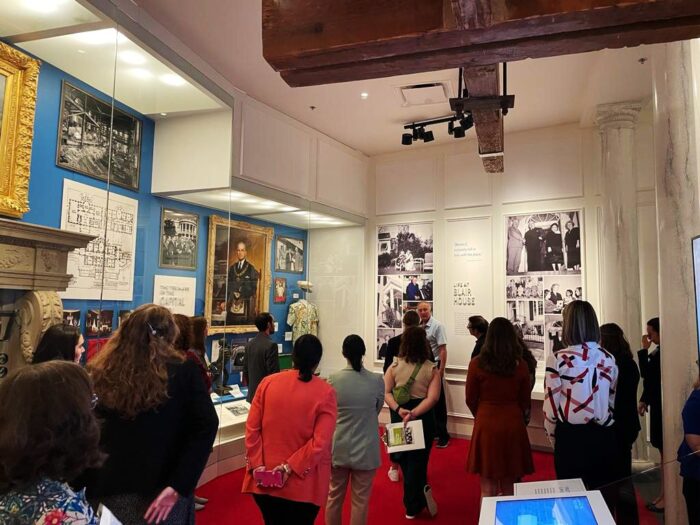
Participants tour the Truman Library.
The Kansas City Summit emphasized how diplomacy is driven by the participation and buy-in of local communities, and not just the nation’s capital alone. Participants left with a deeper understanding of the interplay between foreign and domestic policy, as well as a renewed commitment to promoting citizen diplomacy and international exchange initiatives from the heart of the nation.
The Diplomacy Begins Here Regional Summits are an important platform to connect and engage U.S. and global audiences and introduce local communities to the vital work of the Global Ties Network. As local hubs for global engagement, the Global Ties Network has deep roots, wide reach, and real impact in their communities. The 2023 Summits in Vermont and Missouri facilitated discussions on the crucial intersection of diplomacy, foreign policy, and climate change. These two events introduced local communities to global initiatives while providing invaluable opportunities to inform and inspire audiences to contribute to positive change.
As we approach 2024, we are excited to convene our international exchange community at more regional Summits across the United States. We anticipate the continued development and impact of these Summits in fostering international cooperation and shaping a more sustainable and interconnected world. See you next year.
